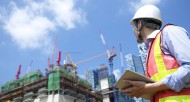Hexagon President and CEO Ola Rollén returned to a newly-energised HxGN LIVE Global 2022 for a keynote address about the challenges of operating sustainably in a post-lockdown world – and how autonomy may be the answer.
Hexagon President and CEO Ola Rollén delivered the keynote speech Monday night at HxGN LIVE Global 2022, welcoming the gathering of employees, customers, partners and sponsors back to the company’s first in-person conference since 2019. With attendees gathered in the Venetian Resort and Hotel in Las Vegas, the anticipation was palpable as a spectacular video presentation filled the darkened room. Things had changed a lot since the last time they were together and many wondered what – if anything – they could do to bounce back from the industry upset caused by the COVID-19 pandemic.
Once the Hexagon CEO took the stage, those fears were quickly assuaged.
“As I woke up at three o’clock this morning, bleary eyed, I thought… even the jet lag feels good,” Rollén began, subtly basking in the familiarity of a return to something resembling normalcy. But a return to the “normal” of early 2020 was not the goal of the address.
A video featuring inspirational figures known for overcoming early setbacks – Beethoven, Einstein and Edison shared the company of The Beatles, Oprah Winfrey and Michael Jordan – set the tone, noting that the very obstacles to their success became their defining gifts.
“Specifically, I’d like you to think about this… what stands in the way becomes the way,” Rollén offered to the room, evoking a quote from Roman emperor and philosopher Marcus Aurelius. It was no coincidence that a figure of Aurelius’ stature was an inspiration to the evening’s proceedings, as Rollén used the stage as a platform to challenge the assumptions of industry’s past and own the mistakes of its present. This was more than a simple message of resilience and adaptability – it was confronting the fact that the world has fundamentally changed, and that businesses can no longer view their response as a stopgap until things revert to the way things used to be.
Rollén believes that the secret to creating the next era of sustainable business lies in the responses seen around the world when life and business completely shifted in 2020. while small businesses failed catastrophically during the 2008 financial crisis, he noted, they grew and thrived in the same timeframe during the early pandemic. The restrictions of the pandemic became the key to the creative solutions that arose from it – what stood in the way became the way, and the same could be said for the ongoing struggle to incentivise sustainability during a crucial moment in humanity’s history.
Rollén launched into a flurry of charts and graphs reflecting the planet’s history and humanity’s impact, reflecting on data showing that the past 30 years of industry far outpaced the CO2 emissions generated all the way from the beginning of the Industrial Revolution to 1990. And while these sobering facts and figures were nothing entirely new to most, the slowdown in worldwide emissions during the pandemic were an eye-opener for the sustainability-conscious CEO.
“The lockdown happened, and human activity ground to a halt… In some city centers around the world, emissions were reduced by up to 80%,” Rollén said, noting the massive drops in emissions by countries like Brazil, India, and even the United States. But the answer to the climate issue, he assured the attendees, was obviously not to lock us all at home forever.
This, he avows, is the key – systemic, sustainable change by enriching human activity and industry through technology, rather than stopping it. Humans, he says, are best at creative, purposeful and fun tasks, while the mundane, repetitive and dangerous lead to the errors and waste that have placed the planet in peril.
“This happened on our watch,” Rollén said, his tone taking on an air of penitent conviction. “We do not want to go down in history as the CO2 generation, the generation that polluted this planet and destroyed it.” Doing this, he said, will require another inversion – getting accountability for climate impact out of industry’s way, and making it the way forward.
The promise of maintaining accountability to shareholders while still making the necessary changes to operate sustainably has been offered before, to no avail. Rollén believes that this is because, quite simply, our solutions are held back by the constraints of our current reality: time, distance and knowledge. Addressing the complex nature of the world’s problems, he says, will require a shift into a new Smart Digital Reality, but not the flashier manifestations of the metaverse we’re used to seeing.
Smart Digital Realities are rooted in reality and allow for the creation of fully autonomous systems that can interact meaningfully with the real world. The use of digital twins and other reality capture technology can remove the need for human intervention and enable a system to act autonomously, taking over the mundane and dangerous tasks that lead to wasted resources and excess consumption.
The industries present at the keynote were each lovingly taken to task, with a thoughtful and complete look at the inefficiencies born from their operations reminding them that the changes he had been evangelising were theirs to take on. This, he said, was the perfect time to fail, to try new things and embrace a new reality before it is too late to save our world.
Rollén reached the conclusion of his talk much as he began, juxtaposing the challenges that lie ahead with an inspired – and inspiring – dedication to humanity’s ability to solve them. A quote from entrepreneur Peter Diamandis appeared on the screens flanking the stage: “The day before something is truly a breakthrough, it’s a crazy idea.”
But the purpose of this conclusion was not to burden the crowd with the labor of a whole new way of doing business – it was an assurance that this group of leaders and thinkers were uniquely suited to the task.













 "
" 


